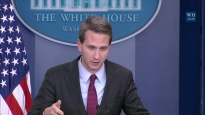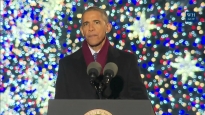President Obama on the American Jobs Act in Chesterfield, Virginia
October 19, 2011 | 17:51 | Public Domain
Sixth stop on the American Jobs Act Bus Tour.
Remarks by the President on the American Jobs Act
Fire Station 9
North Chesterfield, Virginia
2:29 P.M. EDT
THE PRESIDENT: Hello, everybody!
AUDIENCE: Hello!
THE PRESIDENT: It is good to be in Chesterfield County. Thank you so much for the wonderful welcome.
AUDIENCE MEMBER: We love you!
THE PRESIDENT: Well, I love you back. (Laughter.)
It is great to be in Virginia. It is great to be here at Fire Station #9 with some of Chesterfield’s finest. (Applause.)
AUDIENCE MEMBER: Ooh-ah!
THE PRESIDENT: There you go.
First of all, I want to thank Chief Urquhart not only for the introduction, but for the great service that he's been providing for -- 22 years, is it?
CHIEF URQUHART: Yes, sir.
THE PRESIDENT: -- 22 years. Give him a big round of applause. (Applause.) And I want to say thank you to the Chief of Chesterfield County Fire and EMS, Loy Senter. Give him a big round of applause. (Applause.) I appreciate opening up the firehouse here today. But if the bell goes off, just ignore me, do your thing. (Laughter.)
We’ve been on a little road trip over the last few days. I've got a pretty nice ride -- it's not your normal RV. And it's parked outside. We’ve been seeing some sights; we've been eating some good food. Most importantly, we've been getting a chance to hear from the American people. And it’s always nice to spend a few days outside of Washington, because it doesn’t seem like your voices are being heard the way they need to be heard in Washington.
Times are tough all over, and a lot of folks here in Virginia have spent months looking for work. Others are just barely making it -- and they're having to make hard choices and they're having to make sacrifices. It’s hard, obviously, watching friends or family or neighbors who are struggling. And all of us, I think, are mindful of the fact that the economy is not where it needs to be.
I think most people understand that the economy and its problems didn’t happen overnight, so we're not going to solve all these challenges overnight. It's going to take time to rebuild the kind of America in which everybody has a fair shot, everybody is paying their fair share; where responsibility is rewarded; where the deck is not stacked against middle-class families -- in fact, we have a middle class that is growing again and solid again and secure again, and people who are striving to get in the middle class have ladders of opportunity. That's what we're striving for.
We're going to keep on fighting, we're going to keep on working to make sure that we've got the kind of economy that works for everybody, and not just some. And here's the good news: There are things we can do right now that will make a difference. There are things that we can do right now that will put people back to work. There are things we can do right now that will make sure that we are competitive in this global economy.
Some of the challenges we face we're going to have to work on for a while -- improving our schools, making sure that we've got the best infrastructure in the world, making sure that we're bringing down our deficit, making sure that we're continuing to invest in science and technology. But there are things we can do right now that will make a difference.
And that’s why I sent to Congress the American Jobs Act. (Applause.) You can go ahead and clap. Go ahead, nothing wrong with it. (Applause.)
This is a jobs bill that contains the kind of proposals that in the past, at least, have been supported by Democrats and Republicans alike. It’s paid for. It will not add to our deficit. And it's paid for by asking the wealthiest of us -- people like me -- to be able to put in a little bit more so that we can make sure that folks who are struggling get the help they need, and that the economy overall is improving.
Independent economists have said it will create nearly 2 million jobs. That’s not my opinion. That's not the opinion of people who work for me and have to tell me what I want to hear. (Laughter.) This is the opinion of independent economists. They say it will help the economy grow. People who study the economy for a living say this would give the economy the jolt that it needs.
Now, a number of people have been asking during the course of this road trip, why have you been visiting some of the most Republican parts of North Carolina and Virginia? And what I’ve had to remind them is that I’m not the Democratic President, I’m not the Republican President -- I’m the President of the United States of America. (Applause.) And I don’t care what party you belong to -- we’re all Americans and we’re all in this together.
And that’s why we didn't call this the Democratic jobs plan or the Republican jobs plan -- we called it the American Jobs Act. (Applause.) We need to put people to work right now. I think most Americans understand that. A recent poll showed that 63 percent of the American people support what’s in the American Jobs Act. Unfortunately, we’ve had 100 percent of Senate Republicans vote against it. A majority think it’s a good idea to keep firefighters on the job. (Applause.)
As tough as the economy may be, I think people may not be aware -- for the last 19 months we’ve had private sector job growth. We’ve seen more than 2 million jobs created in the private sector. The problem is that state and local governments have been very hard pressed, and so they are cutting back on firefighters, police officers, teachers. And that’s one of the biggest challenges we have -- not only because these folks sacrifice for us and provide extraordinary service to us, but also they go to restaurants and they go to the hardware store and they pay a mortgage. And so if folks in the -- if we’ve got firefighters or police officers or teachers who are being laid off, that hurts the small business person down the street. That means that somebody may have their home foreclosed on, and that brings property values down for everybody.
So the provisions that we’ve got in the bill are ones that most people support -- keeping firefighters in the job; keeping cops on the job; putting teachers back in the classroom; giving tax cuts to families; giving tax cuts to small businesses; giving tax cuts to businesses who hire our veterans. I just came from Hampton and we were down there talking to folks who have served our country -- this 9/11 generation -- and are coming back after making all those sacrifices and are finding themselves fighting for work. We’ve got to do something about that.
The question is why Congress isn’t willing to move. I just want to be fair -- I sent Congress the American Jobs Act and then my Republican friends put out a plan of their own, and they started out calling it "the Real American Jobs Act." So they don't get points for originality. (Laughter.) But I did say, well, let’s see what you’ve got. What are your ideas? And the primary ideas in their jobs plan was to roll back regulations that keep our air and water clean; to go back to the system we had in Wall Street that caused this crisis in the first place --
AUDIENCE: Nooo --
THE PRESIDENT: -- to end the health care reform that we passed that will provide 30 million people health insurance and make sure that insurance companies can't take advantage of you.
Now, that is a plan, but it's not a jobs plan. We can have an argument about health care, or we can have an argument about environmental regulations, but we can't pretend that that's going to actually put people back to work. And that's the number-one priority that the American people have right now.
Their plan says that somehow if we eliminate regulations that keep our air and water clean for our kids, that that's going to help job growth. My plan says, let's hire construction workers and put them back to work rebuilding roads and bridges and schools and fire stations all across the country. (Applause.)
Their plan says that if we roll back health care reform, that somehow jobs are going to be created. My plan says, let's give a tax cut to small businesses to hire the long-term unemployed and our veterans, and make sure that they've got a little more money to keep their doors open, expand their payroll, expand their inventory, get this economy moving.
Their plan says let's go back to a system on Wall Street where there were the kinds of rules that allowed people to take reckless bets that ended up affecting all of Main Street. My attitude is, to strengthen this economy we've got to make sure that those rules are actually enforced, not watered down, and in the meantime, let's work to make sure that we're keeping taxes low for middle-class families who are still struggling to get by.
I just want to repeat: dirtier air, dirtier water, fewer people on health care, less accountability on Wall Street -- that is not a jobs plan.
I understand that some of my Republican friends feel very strongly about these ideas. I'm happy to have a debate. But in the meantime, let's focus on what will actually put people back to work. Keeping first responders on the job -- that's a jobs plan. (Applause.) Putting more teachers in the classroom -- that's a jobs plan. (Applause.)
So what we decided to do, since 100 percent of Republicans in the Senate voted against this plan the first time, is we're going to give them another chance to listen to you. We're going to let them vote on each of these ideas separately, and we'll see if they fight just as hard for your jobs as they fight for their own jobs.
AUDIENCE: Right!
THE PRESIDENT: So the first vote we're going to ask Congress to take this week would put hundreds of thousands of firefighters back on the job, police officers back on the street, teachers back in the classroom.
Now, Chesterfield has been lucky. It isn't facing layoffs right now. But a lot of these guys have seen their pay frozen. You've got cities and states like Michigan and New Jersey that have had to lay off big chunks of their forces. That means that firefighters can't always get to fires before they become major fires. And that makes their job more dangerous. It means police officers can't respond to every crime. And when giving our children the best education possible we know is the ingredient for success in this new information and technology-rich economy, how can we be laying off teachers -- when other countries are hiring teachers in droves? It's unfair to our kids. It undermines our future.
So this week Congress is going to get to vote on whether or not hundreds of thousands of police officers and teachers and firefighters get back on the job. And I don't know if these members of Congress -- maybe they haven't met some of these firefighters. I don't think they want to tell them that their jobs aren’t worth saving. Some of these guys are pretty big. (Laughter.) Captain Kemp is an ex-Marine -- which means he's still a Marine. And these guys are risking their lives every day on our behalf. These jobs are worth fighting for.
Folks in Congress are also going to get a chance to decide -- later in the month -- whether our construction workers should sit around doing nothing while China builds the best railroads, the best schools, the best airports in the world.
We used to have the best stuff. Think about -- the world used to say, let's travel to America. Let's see the Golden Gate Bridge. Let's see the Hoover Dam. Let's see these amazing things that America built. Are we going to be the generation where we stop building? Where we've got rundown roads and bridges that are deemed obsolete? That's not who America is.
So Congress will have a chance to see if they want to put Americans back to work doing the work that America needs done.
They say that they value our veterans. When I went before the joint Congress to present this American Jobs Act I said, let's give tax breaks to companies that are hiring our veterans. And we just got 25,000 -- a pledge of 25,000 jobs from companies all across the country, aiming for a goal of 100,000 veterans being hired by the end of 2013. (Applause.)
So when I talked about this part of the plan before the joint session of Congress, everybody rose up -- Democrats and Republicans alike. So the question now is, if you all stood and applauded, how are you going to vote? It's not enough to applaud and go to a Veterans Day parade. People need help. And you've got a chance to help them right now.
These are the choices that Congress will be presented with in the next few weeks. And if they vote against these proposals, if they say no to steps we know that will put people back to work right now, they're not going to have to answer to me -- they're going to have to answer to you. They're going to have to come down here and tell folks in Virginia and all across the country why people are going to have to cope with fewer first responders; why your kids can’t have teachers back in the classroom. They’re going to have to look construction workers in the eye and tell them why they’re sitting idle instead of rebuilding infrastructure that we know needs to be rebuilt.
And they’re going to have to explain why we couldn’t afford to do it when we know that we can pay for all of this, plus keep taxes on middle-class families low, prevent them from going up, and all we have to do in order to pay for it is make sure the people like me are paying our fair share of taxes, and that companies no longer are getting special tax loopholes. That’s it.
So when you hear that, well, the reason we’re not supporting it, we like the ideas but we don’t want to see higher taxes -- if we don’t pass this bill, taxes for the average family will go up, because the payroll tax cut that we passed in December will lapse. If we do pass this bill, for 97, 98 percent of Americans, your taxes will stay low. My taxes will go up a little bit, but I can afford it.
A fair shot for everybody; a fair share from everybody -- that’s a principle that built America. That’s how we created a middle class.
Now, they can do the right thing in Congress and put people back to work right now and reopen firehouses. But I’m going to need your help. I need you -- and that’s the reason I’m here. It’s wonderful to have a chance to see everybody and shake hands and take pictures. But the main reason I’m here is I want you to send a message to Congress that this is important. Let them know. Or get on the phone, write a letter, fax, tweet -- whatever it is that people do these days -- (laughter) -- and remind members of Congress what’s at stake here.
You know, it takes a special kind of bravery to be a firefighter. When that bell rings, it takes a special kind of courage to answer the call and rush, at great risk to yourself, to help your fellow citizens. And you know what, that’s the same kind of spirit that I believe embodies America -- looking out for one another, helping each other, being willing to make sacrifices for the greater good. When our friends and neighbors are hurting, we don’t cross our arms and just do nothing. We roll up our sleeves and we say we’re going to help; we’ll figure out how to solve this problem. We are not people who sit idly by and ignore our challenges. We step up and we meet those challenges. And that’s the opportunity we have right now. (Applause.)
So I hope everybody is with us. We hope that you are willing to contact your members of Congress. Tell them to get busy. Tell them to get to work. Tell them to put people back to work. And let’s show the world once again why the United States of America is the greatest country on Earth. (Applause.)
Thank you. God bless you. And God bless the United States of America. Thank you very much. (Applause.)
END
2:48 P.M. EDT
|
December 2, 2016
|
December 2, 2016
|
December 2, 2016
|
December 1, 2016
|
|
December 1, 2016
|
November 30, 2016
|
November 30, 2016
|
November 30, 2016
|
- &lsaquo previous
- …
- 4
- 5
- 6
- 7
- 8
- 9
- 10
- 11
- 12
- …
- next &rsaquo







